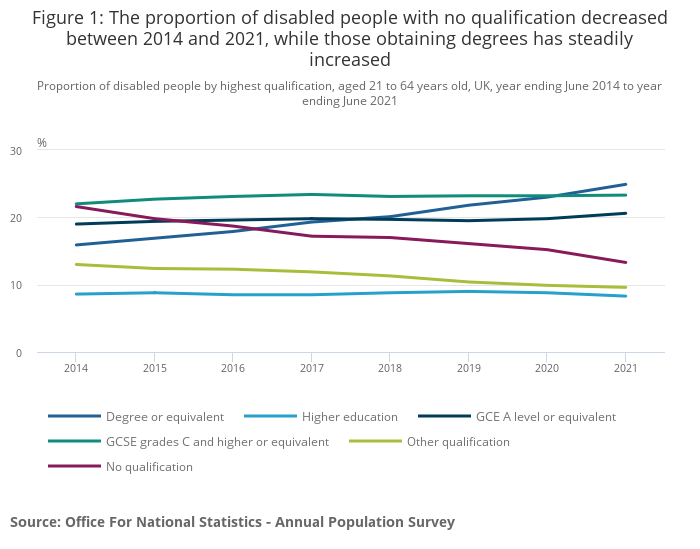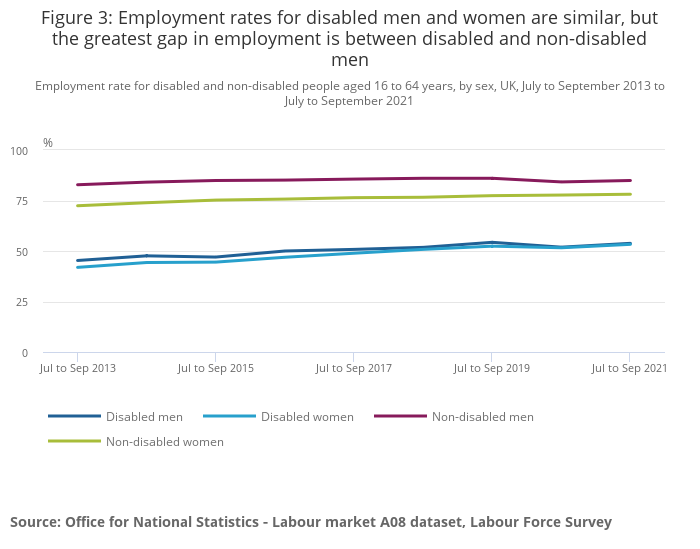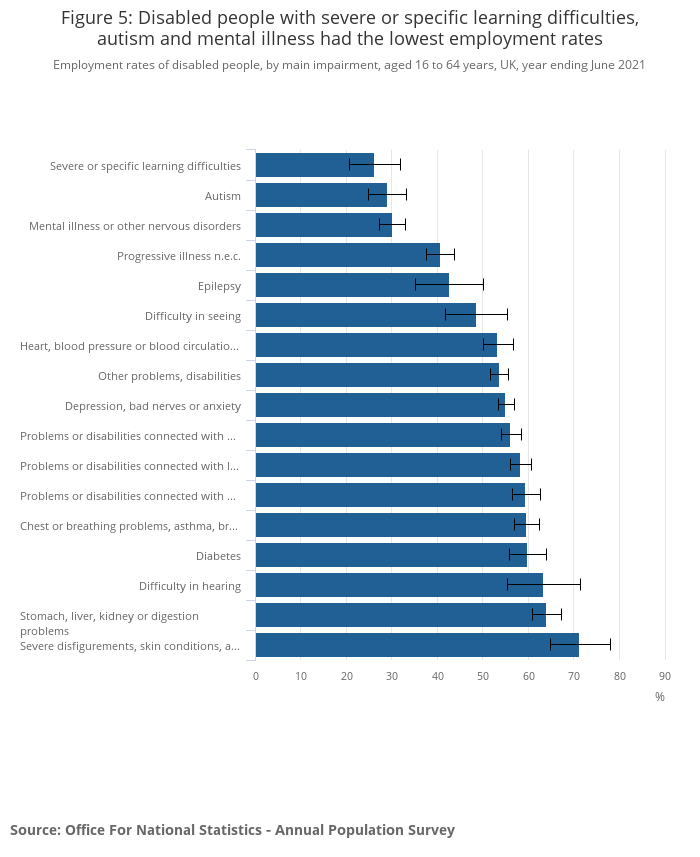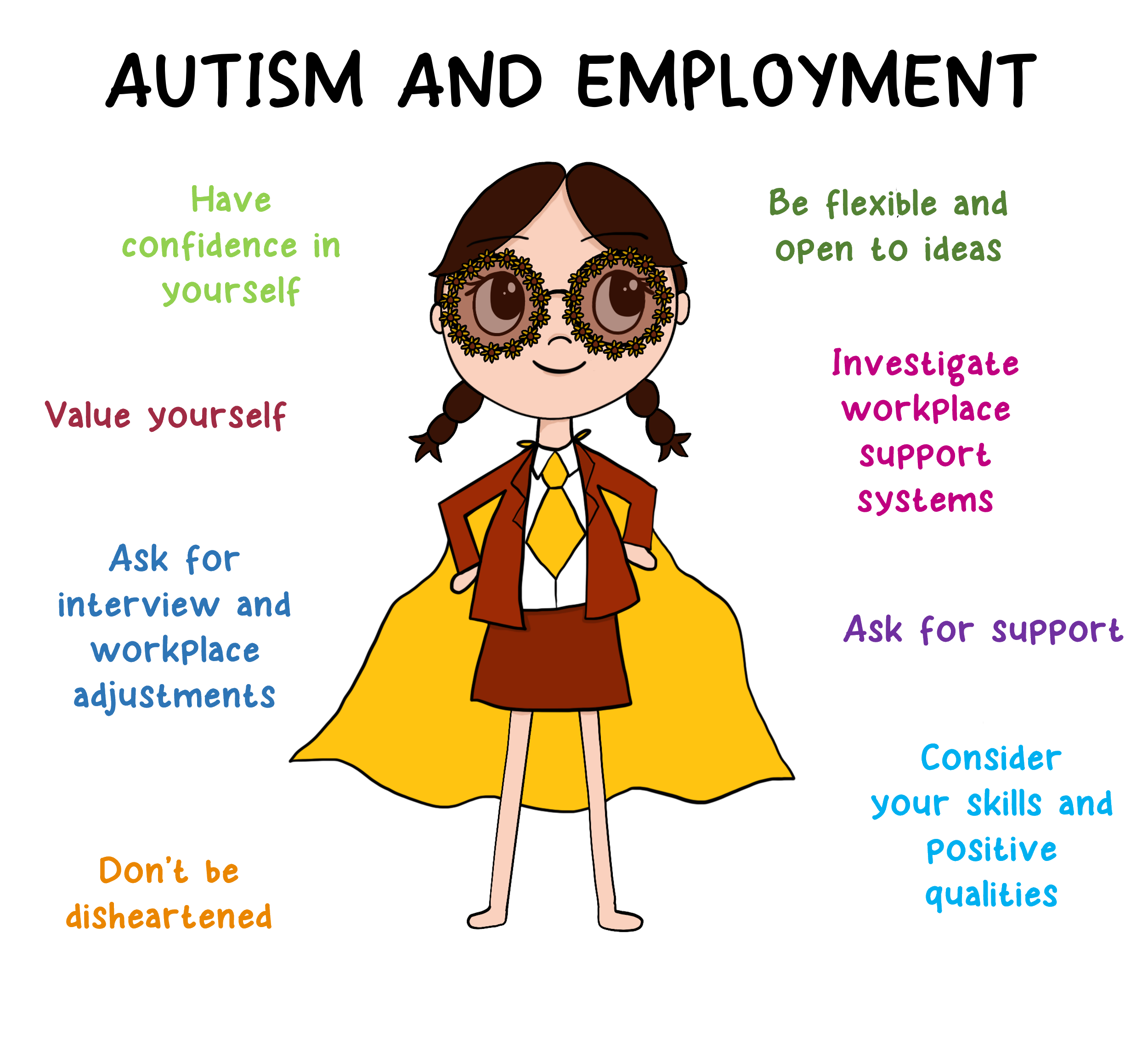Earlier this year, I spoke at the National Autistic Conference, Autscape, alongside my best friend Vera Pudilova, about succeeding in the work environment, as autistic individuals. That’s not to say we’re both doing amazingly, or that we know best – but we both have had interesting journeys through employment in the last year since university, and so we felt we had a story to tell, and maybe some advice. In our presentation we also thought it important to highlight how big the problem of employment for disabled people is in the UK.
(This post, by the way, will be part of a potential series of posts about autism and the workplace!).
The most recent publishings from the government were released in February 2022, and show us the scale of the ‘autism employment gap’. Some of the most interesting findings were:

A quarter (24.9%) of disabled people aged 21 to 64 years had a degree or equivalent as their highest qualification, compared with 42.7% of non-disabled people. In addition, disabled people were almost three times as likely to have no qualifications (13.3%) than non-disabled people (4.6%). And overall, across all age groups (21 to 64 years), disabled people were less likely to have obtained a degree and more likely to have no qualifications than non-disabled people. This is obviously a big barrier to employment in modern society, where many jobs require a degree, and even if they don’t, individuals are often competing with people with degrees.

Around half of disabled people aged 16 to 64 years (53.5%) in the UK were in employment compared with around 8 in 10 (81.6%) for non-disabled people (July to September 2021). This is very concerning to me, and I was even more disheartened to see that the employment rate for autistic individuals was one of the lowest within the disabled population, at 29%. We are just as able as anyone else, and I feel strongly that the problem does not lie with us, but with the current support systems in place for disabled people in employment and who are seeking employment.
Of the 29% of autistic individuals in employment, only 16% are employed fulltime.

Disabled people aged 16 to 64 years had poorer ratings than non-disabled people on all four personal well-being measures; average anxiety levels were higher for disabled people at 4.6 out of 10, compared with 3.0 out of 10 for non-disabled people (year ending June 2021). This data on wellbeing reminds me just how important an issue this is. I believe lack of employment and independence is one key driver behind these statistics. Not being able to earn a wage and ‘do’ something can be incredibly frustrating and upsetting. I also think that the poor wellbeing of disabled individuals contributes to the lack of employment. The lack of support in general life leads to low confidence and motivation to work, and simply to less ability to function.
So what is causing all this? It’s not that we aren’t able, and it’s not that we don’t want to work – 40% of autistic adults working part time want to work more hours, and 77% of unemployed autistic adults want employment.
Research by Mencap in 2017 identified the following main barriers:
- Negative attitudes and low expectations
- Qualifications
- Lack of support programmes and appropriate opportunities
- Unfair treatment such as discrimination
- Accessibility issues
- Mental health and isolation.
Even though I am in fulltime employment, I have come across many of these, in my own experience as well as in the stories of friends. I personally have struggled a lot to cope in a high-pressure work environment, and even though I was able to feel supported through some really valuable workplace adjustments, my mental health declined. I am still working on my mental health issues, but for now am unsure of what the future holds for me, though I am determined to get back to working fulltime as soon as I truly am ready. I am learning to prioritise myself and to accept change, and to understand what I need from work, and what I want from a career.
I guess we now come to the question of what is to be done. Well, clearly a lot needs to change. And much of that will come from policy, and campaigning. We also need much greater awareness of our rights. But for now, I want to leave you with some general advice when considering work, as an autistic individual:
- Don’t be disheartened if things don’t go to plan in your journey to work – we are all learning!
- Be flexible and open to different ideas
- Make sure to ask for workplace and interview adjustments
- Have confidence in yourself!
- Look into the support systems your workplace does offer, for example a neurodiversity society, or wellbeing support
- Remember one size does NOT fit all!
- Don’t be afraid to ask for help or support
- Remember to prioritise your mental health, first and foremost
- Remember you ARE valuable
- Consider your skills and positive qualities

Leave a Reply